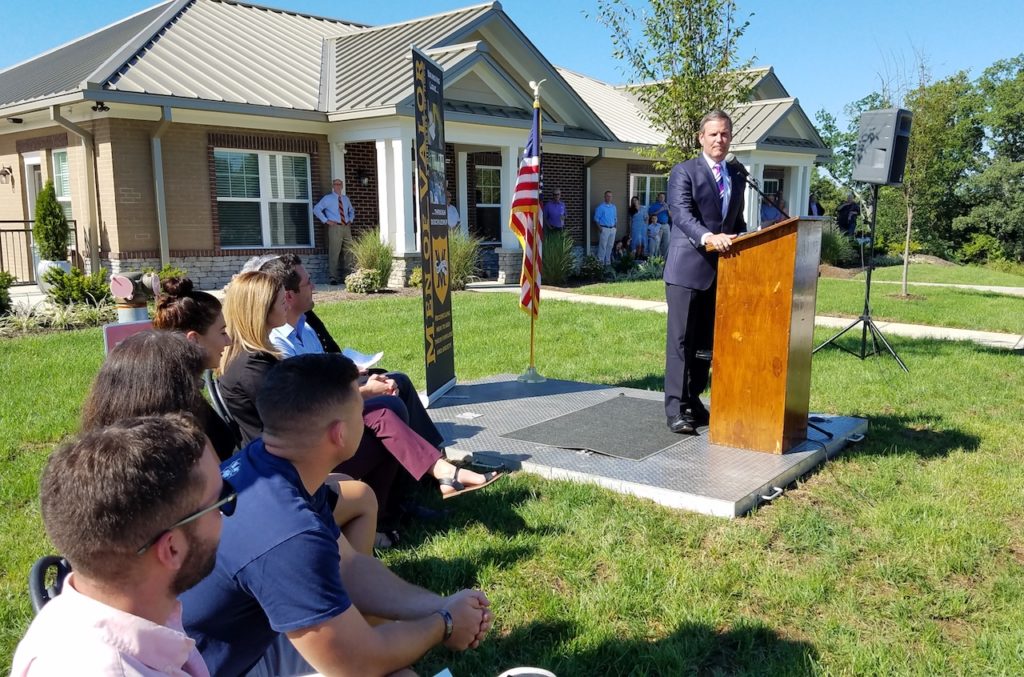
Few Tennesseans knew much about Republican businessman Bill Lee a year ago. But over the gubernatorial campaign, he’s sketched a picture of what motivates him and what he’d do if elected Tennessee governor next month.
Lee’s statements reveal a man who’s very much motivated by his religious beliefs and who plans to build connections with faith groups if in office.
A telling moment came earlier this month, when Bill Lee stood on a stage in Kingsport, in the second of three gubernatorial debates. Both candidates were asked to lay out how they would address opioid addiction.
Lee’s response: Hand the problem over to private organizations, including religious groups.
“State government is never going to solve this problem,” he said. “And, you know, I have said that when I’m governor, we’ll have an Office of Faith-Based and Community Initiatives, where our nonprofit community, our community organizations, our faith community — where we create an environment where they can play a bigger role.”
Lee puts a lot of trust in private nonprofits. Throughout the gubernatorial campaign — on issues as varied as prison reform and health care and education — Lee has pledged to pivot from government programs to supporting the efforts of charitable organizations, especially those with a focus on faith.
It’s an idea that draws deeply from his religious convictions. Since the death of his first wife, an event that Lee describes as life-altering, he says he’s been heavily involved in faith-based groups.
And it’s those religious beliefs that have led him to run for governor.
“I am a man that, in part because of a great tragedy in my life, God used in a powerful way to change my perspective,” Lee says. “I’m a person who believes that the highest call for my life is to serve.”
Lee’s promise to bring his faith into the governor’s office appears to be connecting with voters. Many Republicans say it’s what separated him in the GOP primary. And polling shows him as having a big lead over his Democratic rival, former Nashville Mayor Karl Dean.
One supporter is Bob Marklein, a retired shipping and receiving manager from Lebanon. Last month, he drove to Nashville to meet Lee.
He lists several reasons to support Lee. But they keep coming back to what Marklein describes as Lee’s “stand for Jesus Christ.”
“That’s the main thing,” he says. “And then his positive campaign. He’s not negative. He’s truly, I think, truly a man of God, and we can use him in Tennessee.”
Marklein met Lee at the ribbon-cutting for a group home run by Men of Valor, a faith-based organization that Lee serves on the board of. It plans to build a campus in Antioch that can serve hundreds of former offenders.
Lee spoke at the event. He lamented Tennessee’s recidivism rate, which currently hovers around 50 percent. “What’s so important about what we’re seeing here today is a model for how we can change that,” he said.
Lee says he would encourage the state to partner with Men of Valor — as well as similar organizations to work on other problems.
He hasn’t spelled out exactly how these partnerships would work, which would likely be a challenge. Many of the organizations he praises are fairly small. Unanswered are the logistics of scaling them up to handle statewide issues — or even if they’d want to work with government and accept the strings that come along.
But Lee doesn’t really have to provide those details to win the election, says Kent Syler, a political scientist at MTSU and former Democratic campaign manager.
“This campaign is going to be largely about style and image and less about policy positions,” Syler says. “I really think, by and large, most elections are decided on personality and trust more than issues.”
It’s a stark contrast to Dean, who has staked his campaign on a handful of specific policy recommendations, like expanding Medicaid and boosting teacher pay.
But, Syler says, it’s often more important to sell voters on a vision of where you plan to go than the details, “because issues become very, very complicated when you start getting deep into policy.”
And the vision of turning more problems over to private, faith-based charities may be the direction Tennessee is heading.
Yesterday, we profiled Bill Lee’s Democratic opponent, former Nashville Mayor Karl Dean. You can find that profile and all of our coverage, including their positions on more than a dozen issues, by visiting
wpln.org/nextgovernor.


